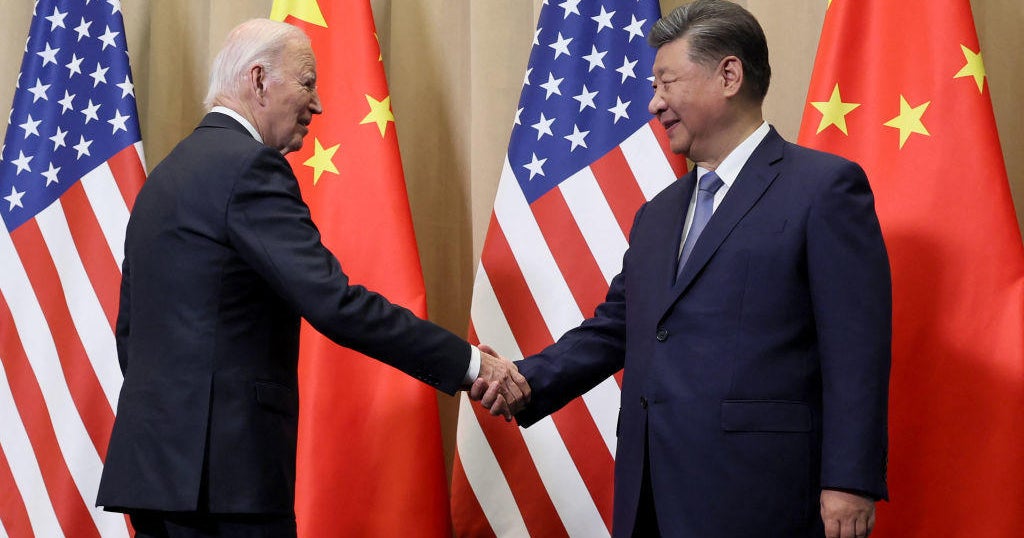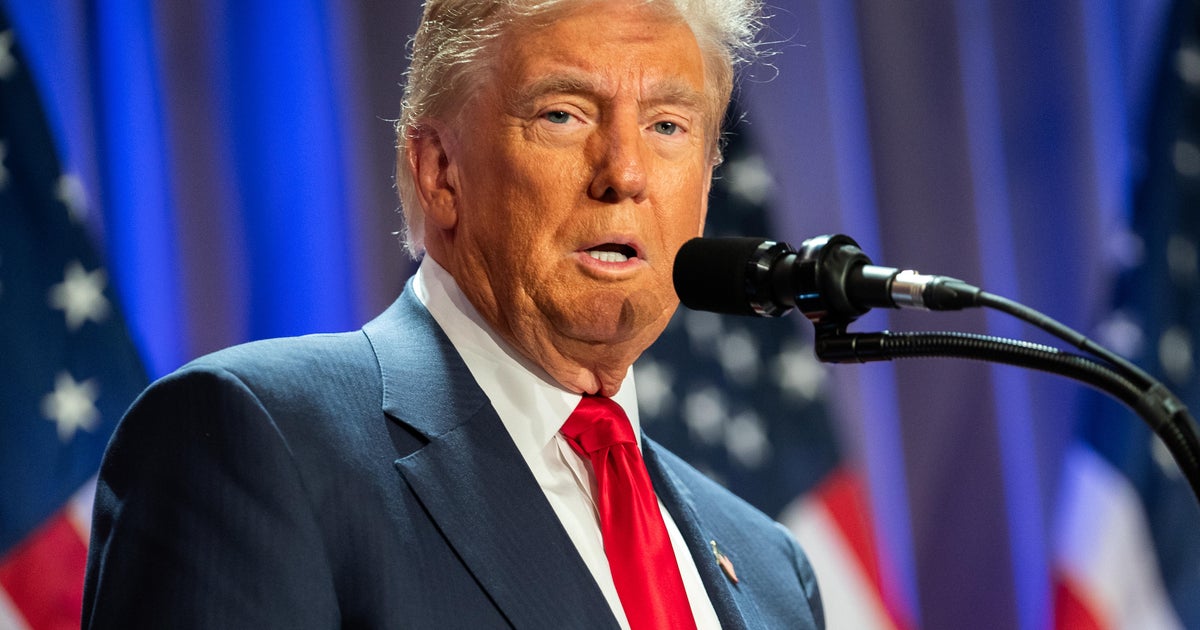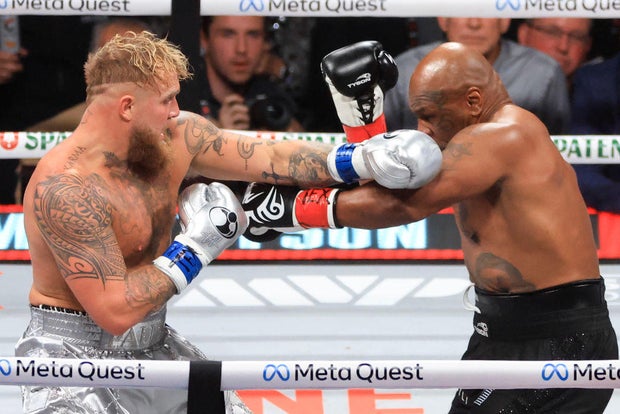CBS News
Are the new AI-powered Windows Copilot+ laptops worth it? Our hands-on opinion

Jason R. Rich
A handful of new laptops just dropped from brands like Asus, Dell and Lenovo, and they all have one new cool thing in common: An AI-powered suite of tools crafted by Microsoft. If you’re ready for a model with the latest AI, you’re going to want to see this.
Thanks to Microsoft’s latest AI integration, new Copilot+ laptops make almost any everyday task faster and smarter — whether it comes to tracking down files, shooting off a text, editing photos, managing a schedule, dealing with emails, or surfing the web.
But, with a price in the four figures, is the new lineup worth it? To find out, I tested the new Asus Vivobook S15 CoPilot+ PC laptop.
Asus Vivobook S15 Copilot+ PC laptop: At a glance
Asus
Operating system: Windows 11 Home | Display size: 15.6 inches | Display type: OLED | Display resolution: 3K (2,880 x 1,620 pixels) | Refresh rate: 120Hz | Max. brightness: 600 nits | Processor: Qualcomm Snapdragon X1 Elite | GPU: Qualcomm Adreno | AI engine: Qualcomm AI | Neural engine: Qualcom Hexagon NPU 45TOPs | RAM: 16GB | Storage: 1TB | Wireless connectivity: Wi-Fi 7, Bluetooth 5.4 | Battery life: Up to 18 hours | Webcam: Full HD with Windows Hello support | Ports: 2x USB 4, 2x USB 3.2 Type-A Gen 1, 1x HDMI 2.1, 1x Audio jack, 1x microSD card slot | Speakers: Harman/Kardon with Dolby Atmos support | Dimensions: 13.88 x 8.93 x 0.58 inches | Weight: 3.13 pounds
The Asus Vivobook S15 CoPilot+ PC is one of the first laptops to integrate Microsoft’s CoPilot AI tools and features. This includes the addition of a Copilot key on the keyboard. Tap the button and get instant access to AI-powered answers and functions.
The Vivobook S15 Copilot+ PC offers cutting-edge hardware specs and the latest AI, but the price point is actually on the low side for what it offers — starting at just $1,300. This computer is incredibly thin (0.58 inches) and lightweight (3.13 pounds), so it’s easy to transport. The 15.6 inch OLED display offers plenty of on-screen real estate and the ability to showcase more than 1.07 billion colors with a 100% DCI-P3 color gamut.
These laptops also feature all-day battery life, plenty of RAM, and advanced built in speaker systems with Dolby Atmos support. They also include professional-quality microphones and a high-resolution webcam, which is great for video calls.
What is Microsoft Copilot+ PC and what does it actually do?
Start with the new Copilot key to quickly activate the AI tool.
Jason R. Rich
Use your voice or your keyboard to find anything on your computer more quickly. You might say, “Find the file with my 2024 personal budget.” The Recall tool can sort through thousands of emails, files, folders, photos and documents to locate what you’re looking for incredibly quickly.
The AI also can help you create artwork using a tool called Cocreator (in Paint). Simple describe what you want make using text or image prompts. And AI-fueling photo editing photos can generate professional-level results in minutes. This includes removing objects or backgrounds from images in seconds. Using the Restyle tool, you can say a sentence like, “Make the colors sharper,” as opposed to using traditional editing tools.
Copilot can also make composing, editing and summarizing text simple. You’re not just limited to your native language either. Text can be translated into more than 40 languages, while videos can display real-time captions in any of more than 40 languages.
During video calls, the Windows Studio Effects tools use AI to adjust lighting and sound, add an on-screen teleprompter feature, enhance voice clarity and allow special effects, backgrounds, blurs and filters to be used in real time.
In addition to Windows, the tech is also embedded into some of the biggest apps you probably use every day, including Microsoft Word, Excel, PowerPoint, Teams, Outlook, OneDrive, OneNote, Chrome, Spotify, Zoom, WhatsApp, Adobe Photoshop, Adobe Lightroom, Blender, Affinity Suite and DaVinci Resolve. We’ll be seeing more major app releases supporting AI later this year.
How Copilot+ PC performs on the Asus Vivobook S15 laptop
The Asus Vivobook S15 Copilot+ PC offers all of the computing power someone could want. It provides a traditional laptop design (so there’s no touchscreen, stylus support or two-in-one functionality). The laptop comes bundled with Windows 11 Home and has the convenient Copilot key located to the right of the spacebar.
Jason R. Rich
The backlit keyboard is larger than on most laptops, which makes touch typing easier. Asus even threw in a numeric keypad on the right and a dozen function keys along the top of the keyboard. Like any of the new Copilot+ PC laptops, the AI tools are available whenever you need them.
In the preinstalled Photos app, there’s now an AI icon. This launches the Restyle Image feature. Within the “Describe what style you’d like to apply'” field, using plain English, simply type how you’d like your photo to look.
The Creativity slider allows you to select the intensity of the edit tool or style being used by the AI. While the slider goes from 1 to 100, anything over 10 often has too much of an impact on the photo. This is also the case when selecting any of the style presets, like Fantasy, Anime, Surrealism or Watercolor.
As I was tinkering with the AI photo editing features, I discovered that they work better on some photos than others. Several of the Style presets, like Renaissance, transformed the main subject of a photo into something else entirely. A trial-and-error approach when working on each photo is often required to come up with the final image you want.
Meanwhile, launching Copilot and selecting the Notebook option is an easy way to access the AI tool for composing content. In the “Whats on your mind?” field, enter a few sentences describing the content you want to compose and the style you want it written in.
The AI-powered suite is all about saving time and making you more efficient. If you stumble upon a webpage that contains a lot of text, Copilot can summarize it in seconds. That said, the summaries are not always 100% accurate or even relevant, so for now at least, you can’t fully rely on what’s generated for you.
Clearly, we’re still in the early days of using AI in everyday computing. But it’s easy to see the potential for where this technology is headed.
Is having a computer with Copilot+ PC functionality worth it?
For some people, sure. What you can do today using Copilot is a giant leap forward when it comes to managing some everyday tasks and keeping the information you need at your fingertips.
Plus, as your computer gets to know your habits and preferences, it’ll automatically handle certain tasks, like scheduling, for you, while helping you communicate more effectively using email, text messaging and video calling. But I wouldn’t rely on the AI for summaries or pro-level photo editing.
Which laptops offer Copilot+ PC?
Computers from Acer, Asus, Dell, HP, Lenovo, Microsoft and Samsung are all offering this AI-powered suite. Many of these laptops support the latest Wi-Fi 7 protocol for super-fast internet connectivity. They’re also thinner, lighter and faster than most traditional Windows laptops. Most weigh less than three pounds and are powered using one of the new Qualcomm Snapdragon X series processors.
Microsoft
Here are the first laptops that are Copilot+ PC computers:
- Asus Vivobook S15 ($1,270 and up) – Features a 15.6-inch 3K OLED resolution display with a 120Hz refresh rate and 100% DCI-P3 color gamut
- Dell Inspiron 14 Plus ($1,100 and up) – Offers up to a 21-hour battery life and a 14-inch QHD+ display.
- Dell XPS 13 ($1,300 and up) – Offers a 13.4-inch FHD+ display.
- HP Omnibook X 14 ($1,150 and up) – Enjoy up to a 26-hour battery life and a 14-inch, 2.2K resolution touchscreen.
- Lenovo Yoga Slim 7x ($1,199 and up) – You get a 14-inch, 3K OLED display offering a maximum brightness of 1,000 nits.
- Microsoft Surface Laptop ($1,000 and up) – Experience up to a 20-hour battery life and a 13.8-inch or 15-inch HDR touchscreen.
- Microsoft Surface Pro 11th Edition ($1,000 and up) – Two-in-one laptop with a detachable keyboard, up to 14-hour battery life and a 13-inch OLED (or LCD HDR) display.
- Samsung Galaxy Book 4 Edge ($1,350 and up) – Includes a 14-inch or 16-inch AMOLED 2x display and between a 18- and 22-hour battery life.
CBS News
Mike Tyson says he has “no regrets” after losing boxing match to Jake Paul

Despite losing his boxing match to Jake Paul, Mike Tyson in a social media post Saturday said he had “no regrets” to getting “in ring one last time.”
The boxing legend was defeated by social media star Jake Paul in a highly anticipated fight on Friday night with an age difference of over three decades between the two contenders.
Netflix said Saturday that 60 million households worldwide tuned in to watch the match. The two fighters went eight full rounds, with each round two minutes long. Paul defeated Tyson by unanimous decision and the 27-year-old upset boxer and 58-year-old former heavyweight champion hugged afterward.
Paul was expected to earn about $40 million from the fight, and Tyson was expected to take around $20 million for the fight, according to DraftKings and other online reports.
Getty Images
Tyson said on his social media that “this is one of those situations when you lost but still won. I’m grateful for last night.”
The fight almost didn’t happen after Tyson experienced an ulcer flare-up while on a plane in March. He addressed his illness Saturday, writing that he “almost died in June.” He said he had eight blood transfusions and “lost half my blood and 25lbs in hospital and had to fight to get healthy to fight so I won.”
Tyson retired from boxing in 2005 after a 20-year career. He last fought in a 2020 exhibition match against former four-division world champ Roy Jones Jr.
“To have my children see me stand toe to toe and finish 8 rounds with a talented fighter half my age in front of a packed Dallas Cowboy stadium is an experience that no man has the right to ask for. Thank you,” he said.
Alex Sundby and
contributed to this report.
CBS News
In their final meeting, Xi tells Biden he is “ready to work with a new administration”

In their final meeting, China’s leader Xi Jinping told U.S. President Biden that his nation was “ready to work with a new administration,” as President-elect Donald Trump prepares to take over.
The two leaders gathered Saturday on the sidelines of the annual Asia-Pacific Economic Cooperation summit. Mr. Biden was expected to urge Xi to dissuade North Korea from further deepening its support for Russia’s war on Ukraine. It marked their first in-person meeting since they met in Northern California last November.
Without mentioning Trump’s name, Xi appeared to signal his concern that the incoming president’s protectionist rhetoric on the campaign trail could send the U.S.-China relationship into another valley.
“China is ready to work with a new U.S. administration to maintain communication, expand cooperation and manage differences so as to strive for a steady transition of the China-U.S. relationship for the benefit of the two peoples,” Xi said through an interpreter.
LEAH MILLIS/POOL/AFP via Getty Images
Mr. Biden, meanwhile, spoke in broader brushstrokes about where the relationship has gone and reflected not just on the past four years, but on their long relationship.
“Over the past four years, China-U.S. relations have experienced ups and downs, but with the two of us at the helm, we have also engaged in fruitful dialogues and cooperation, and generally achieved stability,” he said.
Mr. Biden and Xi, with top aides surrounding them, gathered around a long rectangle of tables in an expansive conference room at Lima’s Defines Hotel and Conference Center.
There’s much uncertainty about what lies ahead in the U.S.-China relationship under Trump, who campaigned promising to levy 60% tariffs on Chinese imports.
Bobby Djavaheri, president of Los Angeles-based Yedi Houseware Appliances — which manufactures its products in China — told CBS News in an interview this week that such tariffs “would decimate our business, but not only our business. It would decimate all small businesses that rely on importing.”
Trump has also proposed revoking China’s Most Favored Nation trade status, phasing out all imports of essential goods from China and banning China from buying U.S. farmland.
Already, many American companies, including Nike and eyewear retailer Warby Parker, have been diversifying their sourcing away from China. Shoe brand Steve Madden says it plans to cut imports from China by as much as 45% next year.
White House national security adviser Jake Sullivan said Biden administration officials will advise the Trump team that managing the intense competition with Beijing will likely be the most significant foreign policy challenge they will face.
It’s a big moment for Mr. Biden as he wraps up more than 50 years in politics. He saw his relationship with Xi as among the most consequential on the international stage and put much effort into cultivating that relationship.
Mr. Biden and Xi first got to know each other on travels across the U.S. and China when both were vice presidents, interactions that both have said left a lasting impression.
“For over a decade, you and I have spent many hours together, both here and in China and in between. And I think we’ve spent a long time dealing with these issues,” Mr. Biden said Saturday.
But the last four years have presented a steady stream of difficult moments.
The FBI this week offered new details of a federal investigation into Chinese government efforts to hack into U.S. telecommunications networks. The initial findings have revealed a “broad and significant” cyberespionage campaign aimed at stealing information from Americans who work in government and politics.
U.S. intelligence officials also have assessed China has surged sales to Russia of machine tools, microelectronics and other technology that Moscow is using to produce missiles, tanks, aircraft and other weaponry for use in its war against Ukraine.
And tensions flared last year after Mr. Biden ordered the shooting down of a Chinese spy balloon that traversed the United States.
CBS News
Trump selects Liberty Energy CEO Chris Wright as secretary of Energy

President-elect Donald Trump has selected Chris Wright, a campaign donor and fossil fuel executive, to serve as energy secretary in his upcoming, second administration.
CEO of Denver-based Liberty Energy, Wright is a vocal advocate of oil and gas development, including fracking, a key pillar of Trump’s quest to achieve U.S. “energy dominance” in the global market.
Trump also said in a statement Saturday that Wright will serve on the newly-created National Energy Council, which will be chaired by North Dakota Gov. Doug Burgum, Trump’s selection for secretary of the Interior.
Burgum will oversee a panel that crosses all executive branch agencies involved in energy permitting, production, generation, distribution, regulation and transportation, Trump said in a previous statement.
Wright has been one of the industry’s loudest voices against efforts to fight climate change and could give fossil fuels a boost, including quick action to end a year-long pause on natural gas export approvals by the Biden administration.
Wright also has criticized what he calls a “top-down” approach to climate by liberal and left-wing groups and said the climate movement around the world is “collapsing under its own weight.”
Consideration of Wright to head the administration’s energy department won support from influential conservatives, including oil and gas tycoon Harold Hamm.
Hamm, executive chairman of Oklahoma-based Continental Resources, a major shale oil company, is a longtime Trump supporter and adviser who played a key role on energy issues in Trump’s first term.
Hamm helped organize an event at Trump’s Mar-a-Lago resort in April where Trump reportedly asked industry leaders and lobbyists to donate $1 billion to Trump’s campaign, with the expectation that Trump would curtail environmental regulations if re-elected.
The Energy Department is responsible for advancing energy, environmental and nuclear security of the United States. The agency is in charge of maintaining the country’s nuclear weapons, oversees 17 national research laboratories and approves natural gas exports, as well as ensuring environmental cleanup of the nation’s nuclear weapons complex. It also promotes scientific and technological research.
Republican Sen. John Barrasso, who is expected to become chairman of the Senate Energy and Natural Resources Committee, said Trump promised bold choices for his Cabinet, and Wright’s nomination delivers.
“He’s s an energy innovator who laid the foundation for America’s fracking boom. After four years of America last energy policy, our country is desperate for a secretary (of energy) who understands how important American energy is to our economy and our national security,″ Barrasso said of Wright, adding: “Wright will help ensure America remains committed to an all-of-the-above energy policy that puts American families first.”
Thomas Pyle, president of the American Energy Alliance, a conservative group that supports fossil fuels, said Wright would be “an excellent choice” for Energy secretary. Pyle led Trump’s Energy Department’s transition team in 2016.
Liberty is a major energy industry service provider, with a focus on technology. Wright, who grew up in Colorado, earned undergraduate degree at MIT and did graduate work in electrical engineering at the University of California-Berkeley and MIT. In 1992, he founded Pinnacle Technologies, which helped launch commercial shale gas production through hydraulic fracturing, or fracking.
He later served as chairman of Stroud Energy, an early shale gas producer, before founding Liberty Resources in 2010.

















